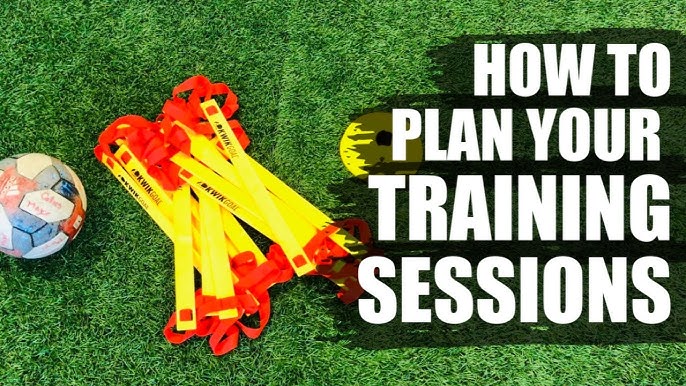How to Structure a Football Training Session

At We Make Footballers, we believe every training session should mix play and purpose. Begin with a fun game, practise a key skill in smaller groups, then bring everyone back for another match. This formula builds muscle memory and joy.
Structuring a Football Training Session: Whole-Part-Whole Approach
With a whole-part-whole approach, coaches set the tone with a lively game and end with another match that tests the same skill. In the middle comes focused work: split your squad into small teams, like 2v2 or 3v3, to practise dribbling, passing or finishing.
For example, you might start with a 5-a-side scrimmage, then move into three stations on shooting drills, close-control runs or quick-pass sequences, and finish with a final kickabout where points reward the skill you targeted.
That back-and-forth rhythm cements learning: young players see how drills slot into real play. It’s simple, effective and exactly the kind of coaching session for football that sticks, and always engaging.
Carousel Approach: Effective Coaching Drills Football
Carousel sessions bring energy and variety: set up three or four skill stations, then rotate small groups through each drill. For instance, station one might focus on quick feet around cones, station two on precision passing through gates, station three on target shooting under light pressure. Groups spend five minutes at each spot, with a brief coach-led demo first and quick water breaks between rotations.
That variety helps young stars stay alert and practise multiple techniques within one training session. – Dribbling dash: set a cone line for straight sprint dribbles, then add a defender shadowing for a realistic test.
Gate passing: use pairs passing through small gates under a time limit, promoting speed of thought and accuracy. Repeat drills twice. – Precision shooting: shoot at mini-goals from varied angles, adjusting distance and adding a keeper to up the challenge.
Progressive Drills: Up the Steps for Skill Development
An up the steps model raises a single skill from basics to match practice. For example, kick-off with static ball control exercises-kids work on sole taps or ankle rolls at their own pace. Next, add a passer or cone defender so they learn to handle pressure. Then shift into a 1v1 scenario to blend touch with decision-making. That gradual ramp-up keeps confidence high and ensures each learner feels clear about what they’re practising.
Finally, wrap up with a mini-match where kids apply that skill in real-time interaction, scoring extra points for successful execution. Mentors should call out coaching cues, such as “lock the ankle” or “head up,” to reinforce the earlier steps. This connection between drills and game play doubles the chance that techniques stick in young minds.
Coaching Session for Football: Top Tips for Coaches
| Tip / Focus Area | Guidance |
|---|---|
| Start with Recap | Begin each session by reviewing last week’s skill before introducing the new focus. |
| Use Simple Language | Kids (ages 4–12) respond better to phrases like “stop the ball” than technical jargon. |
| Keep Drills Moving | Rotate teams every few minutes to maintain focus and prevent boredom. |
| Positive Energy | Your enthusiasm is contagious—set the tone with upbeat energy. |
| Give Clear Cues | Use rally cries such as “turn inside” or “through pass” for direction. |
| Praise Progress | Motivate with encouragement like “well done”, high-fives, or thumbs-up. |
| Limit Breaks | Keep players engaged with constant action—avoid long pauses. |
| Encourage Teamwork | Remind players to call for support and share space with teammates. |
Why Football Training Sessions Outperform Other Sports
Compared to other team sports, football training sessions deliver more touches per player-especially when you use small-sided games. That extra ball time builds confidence and technical skill faster than a typical rugby drill or basketball layup line. Plus, the continuous nature of football fosters stamina and spatial awareness. Kids aged four to twelve develop sharp scanning habits as play flows back and forth, and the open-field format encourages creative problem-solving. Socially, football’s team-based drills and matches require communication at every turn.
That talk-back-and-forth interaction hones social confidence in ways many solo sports don’t. You’ll notice kids grow more comfortable calling for the ball and cheering teammates. Research even suggests football players show better problem-solving skills due to the sport’s rapid transitions. Finally, the inclusive nature of a simple training session means every child can join, score and celebrate together.
We Make FootballersTraining Sessions: Program Overview and Benefits

Our Weekly Football Training for Kids spans 39 weeks across the school year. Each week brings a fresh skill, from dribbling and passing to shooting and defending, with tailored progress checks. Safety checks, DBS-checked coaches and personal feedback make every session calm and confident.
| Program Type | Overview | Key Benefits |
|---|
| Weekly Football Training for Kids | 39 weeks across the school year, covering skills like dribbling, passing, shooting, defending, plus progress checks. | Safe environment with DBS-checked coaches, personal feedback, and structured skill development. |
| Holiday Football Camps | Full-day immersive sessions with games, drills, and tournaments during school holidays. | Quick improvement, social bonding, and fun engagement outside regular training. |
| One-on-One Training | Personalized coaching with tailored drills and detailed feedback. | Sharpens individual technique, builds confidence, and ensures focused attention in a safe space. |
| Performance Programme | Advanced program with pro-level fitness, tactical drills, and club trial preparation. | Supports promising players, guided by world-class coaches for progression to higher levels. |
| Football-Themed Birthday Parties | Fun parties with skills practice, mini-matches, and celebrations. | Memorable experience where all guests enjoy football in a safe, structured environment. |
Next Steps: How to Book and Related Resources
Ready to sign up? Booking a football training session with We Make Footballers is quick. Head to our online portal, choose your child’s age group-under fives, six-to-eights or nine-to-twelve-then pick a convenient location from our map. Slot options include weekday afternoons, weekends or holiday camp dates. Once you check out, you’ll get an email confirmation and all the details you need to arrive prepared and excited. Looking for extra ideas? Check out our blog for articles on small-sided games and camp highlights, or browse coach profiles to find perfect matches. Visit our YouTube channel for short clips of fun drills and real match moments, helping parents see how every skill transfers to game day.
1. Select your child’s age group and nearby location.
2. Pick session type-weekly groups, holiday camp or one-on-one.
3. Complete your booking and receive email confirmation with details.
If you need help, email support@wemakefootballers.co.uk or call 0800-963-7529 for friendly booking support and quick answers.
